Lona Manning's Blog, page 30
June 1, 2018
Need to write a literary review? Use my handy-dandy literary review generator!

Published on June 01, 2018 10:20
May 4, 2018
Guest blog at Lost Opinions
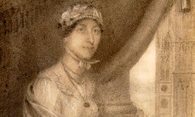 My fellow Austenesque author, Mark Brownlow, lets me talk about why I love 18th century writing over at his website, Lost Opinions. Thanks, Mark!
My fellow Austenesque author, Mark Brownlow, lets me talk about why I love 18th century writing over at his website, Lost Opinions. Thanks, Mark! Visit Mark's website for the interview, stay for the very witty 18th century inboxes--and check out his very civilized novels, Cake and Courtship and The Lovesick Maid!
Published on May 04, 2018 14:27
April 26, 2018
Announcing "Rational Creatures"
I managed to keep the secret, and now we can announce the latest anthology of short stories from editor Christina Angela Boyd.
Rational Creatures is a collection of stories about Jane Austen's female characters. As our editor explains: Jane Austen’s novels evoke romantic imaginings of fastidious gentlemen and gently-bred ladies … Yet through her veiled wit, honest social commentary, and cleverly constructed prose in a style ahead of her day, Austen’s heroines manage to thwart strict mores—and even the debauchery of Regency England—to reach their fairytale endings. But have you never wondered about her other colorful characters like Mary Crawford, Hetty Bates, Elinor Tilney, Louisa Musgrove, et al.—and how they came to be?
In Persuasion, Mrs. Croft says, “But I hate to hear you talking so, like a fine gentleman, and as if women were all fine ladies, instead of rational creatures. We none of us expect to be in smooth water all our days.” Those words have always struck me as terribly modern and I have wondered what Mrs. Croft might have been thinking of when she said those very words to her brother Captain Frederick Wentworth. I believe several of Jane Austen’s characters might have had feminist sensibilities, even if they yielded to the expectations of their sphere. It is our intent that in this collection of backstories or parallel tales off-stage of canon to remain true to the ladies we recognize in Austen’s great works—whilst stirring feminism in the hearts of some of these beloved characters. Thus, our title was born. Rational Creatures.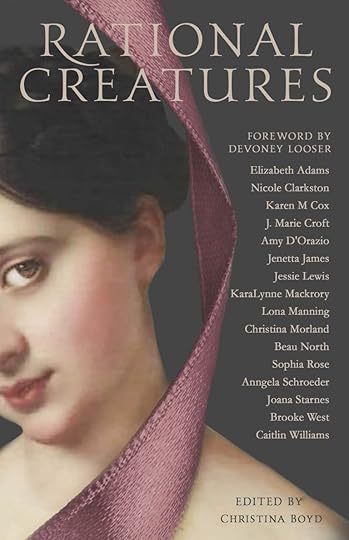
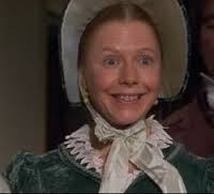 Mrs. Clay having a moment of social anxiety My assigned rational creature is Mrs. Clay, the "clever, insinuating, handsome woman," who tries to flatter her way into the affections of Sir Walter Elliot in Persuasion.
Mrs. Clay having a moment of social anxiety My assigned rational creature is Mrs. Clay, the "clever, insinuating, handsome woman," who tries to flatter her way into the affections of Sir Walter Elliot in Persuasion.
I always wanted to know more about Penelope Clay's story -- why was her marriage "unprosperous"? What was she talking about with Mr. Elliot when Mary and Anne saw her from the window of the White Hart Inn? In my short story, all will be revealed!
Watch for the release of Rational Creatures in October of 2018!
Rational Creatures is a collection of stories about Jane Austen's female characters. As our editor explains: Jane Austen’s novels evoke romantic imaginings of fastidious gentlemen and gently-bred ladies … Yet through her veiled wit, honest social commentary, and cleverly constructed prose in a style ahead of her day, Austen’s heroines manage to thwart strict mores—and even the debauchery of Regency England—to reach their fairytale endings. But have you never wondered about her other colorful characters like Mary Crawford, Hetty Bates, Elinor Tilney, Louisa Musgrove, et al.—and how they came to be?
In Persuasion, Mrs. Croft says, “But I hate to hear you talking so, like a fine gentleman, and as if women were all fine ladies, instead of rational creatures. We none of us expect to be in smooth water all our days.” Those words have always struck me as terribly modern and I have wondered what Mrs. Croft might have been thinking of when she said those very words to her brother Captain Frederick Wentworth. I believe several of Jane Austen’s characters might have had feminist sensibilities, even if they yielded to the expectations of their sphere. It is our intent that in this collection of backstories or parallel tales off-stage of canon to remain true to the ladies we recognize in Austen’s great works—whilst stirring feminism in the hearts of some of these beloved characters. Thus, our title was born. Rational Creatures.

 Mrs. Clay having a moment of social anxiety My assigned rational creature is Mrs. Clay, the "clever, insinuating, handsome woman," who tries to flatter her way into the affections of Sir Walter Elliot in Persuasion.
Mrs. Clay having a moment of social anxiety My assigned rational creature is Mrs. Clay, the "clever, insinuating, handsome woman," who tries to flatter her way into the affections of Sir Walter Elliot in Persuasion. I always wanted to know more about Penelope Clay's story -- why was her marriage "unprosperous"? What was she talking about with Mr. Elliot when Mary and Anne saw her from the window of the White Hart Inn? In my short story, all will be revealed!
Watch for the release of Rational Creatures in October of 2018!
Published on April 26, 2018 07:53
March 21, 2018
Request for Beta Readers!
 Hello! My sequel to my first novel,
A Contrary Wind
, is now ready for the beta reading stage! " A Marriage of Attachment continues the story of Fanny Price, Edmund Bertram and other characters from Mansfield Park. But you do not have to have read my novel or Mansfield Park to be a beta reader. I would like to complete the beta reading stage by April 20th.
Hello! My sequel to my first novel,
A Contrary Wind
, is now ready for the beta reading stage! " A Marriage of Attachment continues the story of Fanny Price, Edmund Bertram and other characters from Mansfield Park. But you do not have to have read my novel or Mansfield Park to be a beta reader. I would like to complete the beta reading stage by April 20th.If you would like to have a look at this Austenesque novel which has romance, suspense and even some danger, please use this link http://bit.ly/amoabeta and use the secure form to send me your email address. I'll be in touch with you.
Published on March 21, 2018 18:07
January 18, 2018
Dad's university bracelet, lost for 60 years...
This story is written in the third person, because I've sent it to the local newspapers in Athens and Oconee, Georgia.... 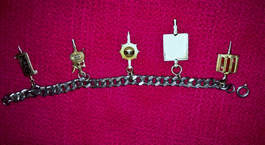 This story has a known beginning and a known ending, but the middle of the story will probably always be a mystery.
This story has a known beginning and a known ending, but the middle of the story will probably always be a mystery.
In 1961, a bracelet slipped from the hand of an easily distracted six-year-old boy in Fayette, Missouri.
Almost sixty years later, Pam Kilpatrick Crawford, a grandmother and active community volunteer, was browsing the jewellery case of a Goodwill thrift store in Athens, Georgia, when she spotted a man's bracelet. The small medallions attached to the chain caught the eye of the self-described "thrift store and flea market junkie." She recognized them as being from University of Georgia. Looking more closely, she saw the name, "J. McRee Elrod" engraved on the back of one the medallions, which further intrigued her, because McRee was the maiden name of her husband's mother.
She bought the bracelet for four dollars, brought it home, and it sat half-forgotten on the top of her dresser for several weeks until she decided to put a call out to her Facebook friends to help her find "J. McRee Elrod."
Every self-respecting Southerner with a Facebook page is going to have friends who are keen genealogists and internet sleuths, and Pam Crawford is no exception. Within minutes, one of her friends found an online obituary for J. McRee Elrod, who had died aged 84 in June of 2016. He was a Georgia native, although he had spent all of his adult life outside of Georgia, and his mother had lived in Athens for many years.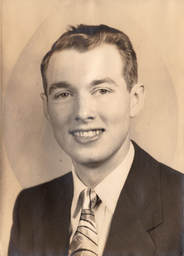 From the obituary, Crawford learned that Jefferson McRee "Mac" Elrod was indeed enrolled at the University of Georgia in Athens, graduating in 1952. He was an outstanding student who was awarded many academic honours, including admittance into the Phi Beta Kappa Society.
From the obituary, Crawford learned that Jefferson McRee "Mac" Elrod was indeed enrolled at the University of Georgia in Athens, graduating in 1952. He was an outstanding student who was awarded many academic honours, including admittance into the Phi Beta Kappa Society.
In his junior year, he'd attended a Christian youth conference in Kansas where he met a pretty blonde Yankee named Norma Cummins. When the two day conference wrapped up, he proposed marriage to her, and although she refused him, they kept in touch with frequent letters.
Fate intervened when Mac won a Carnegie scholarship which enabled him to pursue a master's degree in Nashville, where Norma was also attending university. They were married in 1953. Mac obtained two Master's Degrees (in Library Science and Theology) and was ordained as a Methodist minister at 22 years of age.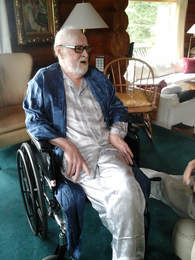 Still in their early twenties, and with an infant son, Mac and his new wife moved to Seoul, South Korea to help that country rebuild from the devastating civil war. Elrod organized the library at Yonsei University during a winter so cold that the ink froze in the ink bottles, shattering them. He also brought Southern hospitality to the strait-laced South Koreans, showing them how to dance the Virginia Reel. His wife raised their son and two daughters, taught English, looked after war orphans and served her homemade apple pies to the constant stream of guests that her husband invited to their home.
Still in their early twenties, and with an infant son, Mac and his new wife moved to Seoul, South Korea to help that country rebuild from the devastating civil war. Elrod organized the library at Yonsei University during a winter so cold that the ink froze in the ink bottles, shattering them. He also brought Southern hospitality to the strait-laced South Koreans, showing them how to dance the Virginia Reel. His wife raised their son and two daughters, taught English, looked after war orphans and served her homemade apple pies to the constant stream of guests that her husband invited to their home.
After five years in Korea, Mac and his family returned to the United States, where he worked as a university librarian in Tennessee and Missouri (where he was involved in the civil rights movement), and Ohio. The family emigrated to Canada in 1968, in large part because of their disillusionment with the U.S. involvement in Vietnam. They became increasingly progressive in their political and religious opinions, leaving the Methodist church and becoming Unitarians. They raised a family of six children in Vancouver, Canada.
Mac was an internationally known figure in the world of library cataloguing, advocated for many social causes and showed no signs of slowing down as he entered his 80's. The greatest sorrow of his life was losing his oldest son to heart failure at age 44. Elrod was diagnosed with leukemia in the spring of 2016. He greeted the news with stoic composure and died three months later.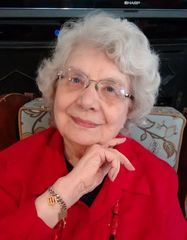 The online obituary that Pam's friend found included an email address for Elrod's oldest daughter Lona Manning, so Pam sent her a message about the bracelet she'd found. Lona, an ESL teacher who works abroad, happened to be in Vancouver at the time, visiting with her widowed mother. Perplexed, and even a little suspicious, she showed the email to her mother.
The online obituary that Pam's friend found included an email address for Elrod's oldest daughter Lona Manning, so Pam sent her a message about the bracelet she'd found. Lona, an ESL teacher who works abroad, happened to be in Vancouver at the time, visiting with her widowed mother. Perplexed, and even a little suspicious, she showed the email to her mother.
"No, your father never wore bracelets," was her mother's first reaction. Lona asked Pam Crawford to email a photo of the bracelet, which she promptly did.
When Mrs. Elrod saw the photo, she instantly recalled a long-forgotten summer day in Fayette, Missouri, almost sixty years ago: Mac was working as head librarian of Central Methodist College. He phoned her from work, asking her to send their son Mark to bring the bracelet to him. (In those days, sending a six-year-old child on a short solo errand was not considered to be unspeakably negligent.)
As Norma recalls, "Mark started out for the library, but, being Mark and being only six years old, he lost it on the way to the campus. When he came back and told me he had lost it, I immediately set out to look along the way, being careful to check into the weeds which lined the path on both sides. Later both Mac and I searched but weren't able to find it."
They gave up, and concluded that the bracelet and its medallions were lost forever.
Who knows where the bracelet spent the intervening years before ending up in that thrift store? Thanks to Pam Crawford, the cherished memento went on one final trip, from Georgia to Canada, the same journey its owner made so many years ago. Found at a thrift store, purchased for just four dollars, the bracelet is now with the Elrod family--a remembrance of the idealistic, energetic young man Norma met all those years ago at a student conference, as well as a sweet remembrance of their oldest son.
Whether Pam Crawford and Norma Elrod are distant relatives by marriage, in addition to being new internet friends, has yet to be determined. They plan to do a little more genealogical digging. But perhaps even the internet cannot solve the mystery of how Mac Elrod's bracelet made its way from the a pathway in Fayette, Missouri to a shop in Athens, Georgia, almost sixty years later.
 This story has a known beginning and a known ending, but the middle of the story will probably always be a mystery.
This story has a known beginning and a known ending, but the middle of the story will probably always be a mystery.In 1961, a bracelet slipped from the hand of an easily distracted six-year-old boy in Fayette, Missouri.
Almost sixty years later, Pam Kilpatrick Crawford, a grandmother and active community volunteer, was browsing the jewellery case of a Goodwill thrift store in Athens, Georgia, when she spotted a man's bracelet. The small medallions attached to the chain caught the eye of the self-described "thrift store and flea market junkie." She recognized them as being from University of Georgia. Looking more closely, she saw the name, "J. McRee Elrod" engraved on the back of one the medallions, which further intrigued her, because McRee was the maiden name of her husband's mother.
She bought the bracelet for four dollars, brought it home, and it sat half-forgotten on the top of her dresser for several weeks until she decided to put a call out to her Facebook friends to help her find "J. McRee Elrod."
Every self-respecting Southerner with a Facebook page is going to have friends who are keen genealogists and internet sleuths, and Pam Crawford is no exception. Within minutes, one of her friends found an online obituary for J. McRee Elrod, who had died aged 84 in June of 2016. He was a Georgia native, although he had spent all of his adult life outside of Georgia, and his mother had lived in Athens for many years.
 From the obituary, Crawford learned that Jefferson McRee "Mac" Elrod was indeed enrolled at the University of Georgia in Athens, graduating in 1952. He was an outstanding student who was awarded many academic honours, including admittance into the Phi Beta Kappa Society.
From the obituary, Crawford learned that Jefferson McRee "Mac" Elrod was indeed enrolled at the University of Georgia in Athens, graduating in 1952. He was an outstanding student who was awarded many academic honours, including admittance into the Phi Beta Kappa Society.In his junior year, he'd attended a Christian youth conference in Kansas where he met a pretty blonde Yankee named Norma Cummins. When the two day conference wrapped up, he proposed marriage to her, and although she refused him, they kept in touch with frequent letters.
Fate intervened when Mac won a Carnegie scholarship which enabled him to pursue a master's degree in Nashville, where Norma was also attending university. They were married in 1953. Mac obtained two Master's Degrees (in Library Science and Theology) and was ordained as a Methodist minister at 22 years of age.
 Still in their early twenties, and with an infant son, Mac and his new wife moved to Seoul, South Korea to help that country rebuild from the devastating civil war. Elrod organized the library at Yonsei University during a winter so cold that the ink froze in the ink bottles, shattering them. He also brought Southern hospitality to the strait-laced South Koreans, showing them how to dance the Virginia Reel. His wife raised their son and two daughters, taught English, looked after war orphans and served her homemade apple pies to the constant stream of guests that her husband invited to their home.
Still in their early twenties, and with an infant son, Mac and his new wife moved to Seoul, South Korea to help that country rebuild from the devastating civil war. Elrod organized the library at Yonsei University during a winter so cold that the ink froze in the ink bottles, shattering them. He also brought Southern hospitality to the strait-laced South Koreans, showing them how to dance the Virginia Reel. His wife raised their son and two daughters, taught English, looked after war orphans and served her homemade apple pies to the constant stream of guests that her husband invited to their home.After five years in Korea, Mac and his family returned to the United States, where he worked as a university librarian in Tennessee and Missouri (where he was involved in the civil rights movement), and Ohio. The family emigrated to Canada in 1968, in large part because of their disillusionment with the U.S. involvement in Vietnam. They became increasingly progressive in their political and religious opinions, leaving the Methodist church and becoming Unitarians. They raised a family of six children in Vancouver, Canada.
Mac was an internationally known figure in the world of library cataloguing, advocated for many social causes and showed no signs of slowing down as he entered his 80's. The greatest sorrow of his life was losing his oldest son to heart failure at age 44. Elrod was diagnosed with leukemia in the spring of 2016. He greeted the news with stoic composure and died three months later.
 The online obituary that Pam's friend found included an email address for Elrod's oldest daughter Lona Manning, so Pam sent her a message about the bracelet she'd found. Lona, an ESL teacher who works abroad, happened to be in Vancouver at the time, visiting with her widowed mother. Perplexed, and even a little suspicious, she showed the email to her mother.
The online obituary that Pam's friend found included an email address for Elrod's oldest daughter Lona Manning, so Pam sent her a message about the bracelet she'd found. Lona, an ESL teacher who works abroad, happened to be in Vancouver at the time, visiting with her widowed mother. Perplexed, and even a little suspicious, she showed the email to her mother."No, your father never wore bracelets," was her mother's first reaction. Lona asked Pam Crawford to email a photo of the bracelet, which she promptly did.
When Mrs. Elrod saw the photo, she instantly recalled a long-forgotten summer day in Fayette, Missouri, almost sixty years ago: Mac was working as head librarian of Central Methodist College. He phoned her from work, asking her to send their son Mark to bring the bracelet to him. (In those days, sending a six-year-old child on a short solo errand was not considered to be unspeakably negligent.)
As Norma recalls, "Mark started out for the library, but, being Mark and being only six years old, he lost it on the way to the campus. When he came back and told me he had lost it, I immediately set out to look along the way, being careful to check into the weeds which lined the path on both sides. Later both Mac and I searched but weren't able to find it."
They gave up, and concluded that the bracelet and its medallions were lost forever.
Who knows where the bracelet spent the intervening years before ending up in that thrift store? Thanks to Pam Crawford, the cherished memento went on one final trip, from Georgia to Canada, the same journey its owner made so many years ago. Found at a thrift store, purchased for just four dollars, the bracelet is now with the Elrod family--a remembrance of the idealistic, energetic young man Norma met all those years ago at a student conference, as well as a sweet remembrance of their oldest son.
Whether Pam Crawford and Norma Elrod are distant relatives by marriage, in addition to being new internet friends, has yet to be determined. They plan to do a little more genealogical digging. But perhaps even the internet cannot solve the mystery of how Mac Elrod's bracelet made its way from the a pathway in Fayette, Missouri to a shop in Athens, Georgia, almost sixty years later.
Published on January 18, 2018 04:54
December 19, 2017
My Christmas present to myself
I published A Contrary Wind last January and designed its cover myself. But I've decided to get a professionally-made cover and have been working with
Dissect Designs
. At first, the design was similar to the one I did, but at the last minute, just as we were about to finalize the design, I thought -- wait a minute. The title of the book is A Contrary Wind, but there is nothing on the cover suggesting wind.
So it was back to the drawing board and now we have two book covers!
Which one should I choose? You can weigh in and cast your vote this week at JustJane1813. (And be entered for a copy of the book)
So it was back to the drawing board and now we have two book covers!
Which one should I choose? You can weigh in and cast your vote this week at JustJane1813. (And be entered for a copy of the book)

Published on December 19, 2017 16:16
November 19, 2017
Cleaning up in China
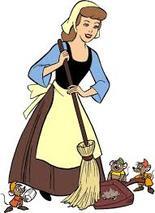 My Aunt Shirley would say of some essential household tool: "I can't keep house without it!" And I sometimes feel that way in China.
My Aunt Shirley would say of some essential household tool: "I can't keep house without it!" And I sometimes feel that way in China.One aspect of living abroad is that some very basic activities and routines are conducted differently, including housecleaning.
Take the simple act of sweeping the floor, for example. In the west, we use a long-handled broom and hold it with both hands. The disadvantage is that you need someone to hold the dustpan for you, or you awkwardly try to handle both broom and dustpan.
 But sweeping evolved differently in China. Here, the brooms are shorter and are used with one hand and the motion feels different.
But sweeping evolved differently in China. Here, the brooms are shorter and are used with one hand and the motion feels different.I wonder if Chinese brooms are shorter because traditionally the handles were made of straw bound together, and a long handle made of straw wouldn't work. It wouldn't be as rigid as a broom handle made of wood.
You can see lots of people still using traditional brooms in China, made of straw or sticks or whatever, especially when they are sweeping off the sidewalks in the morning.
Here are some for sale, along with some simple tin dustpans. The brooms are about 80 centimeters, or two-and-a-half-feet long.
 But even modern brooms, made of plastic, are short-handled. That's what the Chinese are accustomed to. So it's wrong, as we are reminded every time we use our broom.
But even modern brooms, made of plastic, are short-handled. That's what the Chinese are accustomed to. So it's wrong, as we are reminded every time we use our broom. It's so short that a tall person has to bend over a bit when using it. Yes, you can use the long-handled dustpan very easily, one hand on the broom and the other on the dustpan, without calling someone over to help you, but it's still wrong.
I know a foreigner couple who made a long bus trip to a store that sold imported goods just so they could get a "proper" broom, and I know how they feel.
When you go to carry out a familiar household chore, and you have to use a different motion than the one you have been doing all your life, it's like a right-handed person trying to brush their teeth with their left hand.
 After sweeping, it's time to mop, a frequent chore in a country where pollution creates a lot of unhealthy black dust. Incidentally, I have seen very little carpet in private homes here and few households have vacuum cleaners. Floors in Zibo are usually tiled. The area has been a centre for ceramics for thousands of years, so it's not surprising. Wooden laminate floors are also gaining in popularity. At any rate, Chinese floors are mopped, not vacuumed.
After sweeping, it's time to mop, a frequent chore in a country where pollution creates a lot of unhealthy black dust. Incidentally, I have seen very little carpet in private homes here and few households have vacuum cleaners. Floors in Zibo are usually tiled. The area has been a centre for ceramics for thousands of years, so it's not surprising. Wooden laminate floors are also gaining in popularity. At any rate, Chinese floors are mopped, not vacuumed.
The Chinese rely heavily on rag or string mops. The kind of mop that deposits the water on the floor, but there is no way to pick the water back up again, or to wring out the mop, unless you tried to do it with your hands, and yuch, you wouldn't.
These mops just slop water around on the floor and they are smelly and gross. They at least have long wooden handles and you use both hands to mop.
 Celebrity-endorsed new-fangled mop. Here at the "enterance" to the mall, modern spin mops are for sale. They are a very popular item and are heavily promoted. I have seen hundreds of people heading out of the store with these new mops.
Celebrity-endorsed new-fangled mop. Here at the "enterance" to the mall, modern spin mops are for sale. They are a very popular item and are heavily promoted. I have seen hundreds of people heading out of the store with these new mops.
They come with a two-chambered bucket, and you can place the mop on a spindle inside the bucket and spin the mop head dry. No more leaving dirty water all over the floor.
I've written a lot about the rapidly expanding, upwardly mobile, aspirational middle class in China. For me, nothing symbolizes the new middle class more than this very simple household device: the mop.
Published on November 19, 2017 17:37
November 15, 2017
The cashless society in China
 Becky Yances of the blog, Writer, Traveler, Tea Drinker has written an informative post about how in China, everybody (save for the white-haired) pays with their phones now. It's all based on using QR codes.
Becky Yances of the blog, Writer, Traveler, Tea Drinker has written an informative post about how in China, everybody (save for the white-haired) pays with their phones now. It's all based on using QR codes. I recently dabbled a toe in these digital waters. The fact is, when we moved to China, Ross and I stopped using debit and credit cards for the most part and started paying for everything in cash, and I really liked it.
I felt in much better touch with my money, figuratively speaking. Of course, life is simpler here, in that there are fewer things I need to pay for, since I don't own a home and could get meals at the school dining hall.
But over the last few years, we noticed that people were just waving their phones to pay for things. Or we would go to pick up the bill at lunch and our guest would inform us, "Too late, I already paid on my phone." (Arguing over the meal tab is a thing in China.)
Inevitably, I had to move with the times. So I learned how (that is, a student showed me which buttons to push) to link my bank account to the phone, and use two services, Alipay and WeChat, to receive and give payments. Becky points out the advantages this system offers to retailers, and I will add another one that retailers like--I paid by phone at my favourite toiletries store, Watson's, the other day, and--bingo--now that they have a link to my phone, so they are sending me WeChat messages about contests and coupon offers. WeChat is so popular with China's middle class that Tourism Ontario has partnered to provide WeChat to Chinese tourists in Toronto. In the world of fiction and movies, the cellular phone has rendered a lot of favourite old plot devices obsolete. I even used the old device of the purloined letter in my novel, A Contrary Wind. Today of course, Edmund and Fanny would be Facebooking or emailing or something. There is no way you could keep people from communicating with each other. Perhaps the ability to access your cash and your bank account anywhere, anytime (as long as you have internet) will also render some old scenarios implausible as well. Poor Mrs. Smith in Persuasion would get her financial affairs in order without Captain Wentworth's help. (Had to work Jane Austen into this blog post somehow).
Published on November 15, 2017 19:53
November 9, 2017
China AND Jane Austen news!
Do I have the only blog that's about living in China and is also about Jane Austen-inspired fiction? Maybe that means I can call it the Number One blog about both China and Jane Austen!
We'll see how that flies.... but today I had the pleasure of learning that my blog is listed in Sublime China's top ten expat blog picks!
I follow @SublimeChina on Twitter, they post the most fantastic photos. And, in Jane Austen news, the new short story anthology, Dangerous to Know: Jane Austen's Rakes & Gentleman Rogues, (which includes a story from me, plus stories from other popular JAFF writers), is now available for purchase on Amazon. Already got some five star reviews from JAFF fans! How do I feel?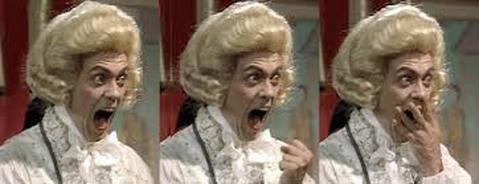
We'll see how that flies.... but today I had the pleasure of learning that my blog is listed in Sublime China's top ten expat blog picks!
I follow @SublimeChina on Twitter, they post the most fantastic photos. And, in Jane Austen news, the new short story anthology, Dangerous to Know: Jane Austen's Rakes & Gentleman Rogues, (which includes a story from me, plus stories from other popular JAFF writers), is now available for purchase on Amazon. Already got some five star reviews from JAFF fans! How do I feel?

Published on November 09, 2017 05:04
November 6, 2017
Let Us Join the Ladies
It is often said that Jane Austen didn't write any scenes with only men present. And the reason given is because men were outside of her sweet-little-country-spinster sphere of reference--how could she write about creatures she never knew? Who knows what the guys talk about when the ladies have excused themselves from the dinner table? I suspect that a more compelling reason for Austen to limit her all-male scenes is that most of her readers are women, and women like stories with women in them. Don't we? We don't want to see a war movie unless there is a romantic interest included, and women are on the covers of women's magazines, not men. Austen read a lot of novels and carefully analyzed them, making note of what she thought was ridiculous or implausible or preachy. She was a great innovator as a writer but she was a shrewd, self-aware writer as well, avoiding subjects and spheres of life that she felt didn't suit her authorial voice. Actually, there are some brief all-male conversations or reported conversations in Jane Austen. There are several in Mansfield Park between Sir Thomas Bertram and his sons. The first comes when Sir Thomas confronts his son and heir Tom about Tom's extravagant spending--because of Tom, Sir Thomas must sell the living in Mansfield parish to another clergyman instead of saving it for his second son Edmund. 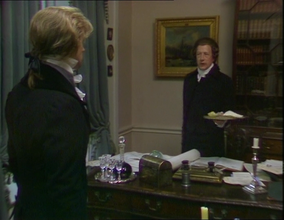 "I blush for you, Tom" "I blush for you, Tom," said he, in his most dignified manner; "I blush for the expedient which I am driven on, and I trust I may pity your feelings as a brother on the occasion. You have robbed Edmund for ten, twenty, thirty years, perhaps for life, of more than half the income which ought to be his. It may hereafter be in my power, or in yours (I hope it will), to procure him better preferment; but it must not be forgotten that no benefit of that sort would have been beyond his natural claims on us, and that nothing can, in fact, be an equivalent for the certain advantage which he is now obliged to forego through the urgency of your debts."
"I blush for you, Tom" "I blush for you, Tom," said he, in his most dignified manner; "I blush for the expedient which I am driven on, and I trust I may pity your feelings as a brother on the occasion. You have robbed Edmund for ten, twenty, thirty years, perhaps for life, of more than half the income which ought to be his. It may hereafter be in my power, or in yours (I hope it will), to procure him better preferment; but it must not be forgotten that no benefit of that sort would have been beyond his natural claims on us, and that nothing can, in fact, be an equivalent for the certain advantage which he is now obliged to forego through the urgency of your debts."
Tom listened with some shame and some sorrow; but escaping as quickly as possible, could soon with cheerful selfishness reflect, firstly, that he had not been half so much in debt as some of his friends; secondly, that his father had made a most tiresome piece of work of it; and, thirdly, that the future incumbent, whoever he might be, would, in all probability, die very soon. In the forthcoming short story anthology, Dangerous To Know: Jane Austen's Rakes & Gentlemen Rogues, my assigned rake is Tom Bertram, and I have included the confrontation excerpted above in my story. I was stretching my imagination to talk like a man, speaking in the first person, at a drinking party! These are the type of scenes that happen offstage in an Austen novel.
The title of my story is taken from something Mary Crawford says to her sister, Mrs. Grant, "you must have the address of a Frenchwoman," that is, you must have the charm, finesse, and persuasive abilities of a Frenchwoman. In Austen's time, "address" didn't mean "mailing address." They used the word, "direction."
Tom Bertram in "The Address of a Frenchwoman," is imagined differently than Tom Bertram as he appears in my novel, A Contrary Wind.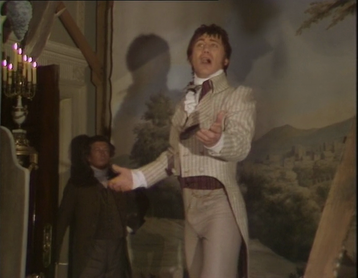 Another brief all-male scene in Mansfield Park, that I think is amazingly cinematic or theatrical, is the moment when Sir Thomas comes back unexpectedly and catches the young people rehearsing an indelicate play. (Notice how Austen uses the
barker's cliche
: this, his first appearance on any stage). The young people try to hide the fact from their father, but of course, since Tom has ordered that a fully-fitted stage be built in the billiard room, and they were using their dad's study for the green room, they are caught red-handed.
Another brief all-male scene in Mansfield Park, that I think is amazingly cinematic or theatrical, is the moment when Sir Thomas comes back unexpectedly and catches the young people rehearsing an indelicate play. (Notice how Austen uses the
barker's cliche
: this, his first appearance on any stage). The young people try to hide the fact from their father, but of course, since Tom has ordered that a fully-fitted stage be built in the billiard room, and they were using their dad's study for the green room, they are caught red-handed.
Sir Thomas goes to his study and finds it all disarranged: The removal of the bookcase from before the billiard-room door struck him especially, but he had scarcely more than time to feel astonished at all this, before there were sounds from the billiard-room to astonish him still farther. Some one was talking there in a very loud accent; he did not know the voice--more than talking--almost hallooing. He stepped to the door, rejoicing at that moment in having the means of immediate communication, and, opening it, found himself on the stage of a theatre, and opposed to a ranting young man, who appeared likely to knock him down backwards. At the very moment of Yates perceiving Sir Thomas, and giving perhaps the very best start he had ever given in the whole course of his rehearsals,
Tom Bertram entered at the other end of the room; and never had he found greater difficulty in keeping his countenance. His father's looks of solemnity and amazement on this his first appearance on any stage, and the gradual metamorphosis of the impassioned Baron Wildenheim into the well-bred and easy Mr. Yates, making his bow and apology to Sir Thomas Bertram, was such an exhibition, such a piece of true acting, as he would not have lost upon any account. It would be the last--in all probability--the last scene on that stage; but he was sure there could not be a finer. The house would close with the greatest eclat.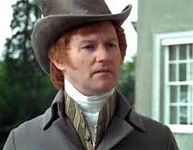 John Dashwood My favourite Austen moment between two men happens in Sense & Sensibility. John Dashwood is trying to promote a match between his half-sister Elinor and Colonel Brandon. Meanwhile, Elinor's younger sister Marianne is absolutely distraught over a disappointment in love. John Dashwood doesn't know that the colonel is in love with Marianne, but the reader does. At an evening party, after Marianne has burst into tears, Dashwood quietly takes the colonel aside: "Poor Marianne!" said he to Colonel Brandon, in a low voice, as soon as he could secure his attention,— "She has not such good health as her sister,—she is very nervous,—she has not Elinor's constitution;—and one must allow that there is something very trying to a young woman who HAS BEEN a beauty in the loss of her personal attractions. You would not think it perhaps, but Marianne WAS remarkably handsome a few months ago; quite as handsome as Elinor.— Now you see it is all gone." Austen ends the dialogue, and in fact the chapter, right there. A lesser author would have continued with some narration to explain what is going through Colonel Brandon's mind at this moment. But Austen holds her readers in higher regard. We are not
dull elves.
We know that Colonel Brandon still loves Marianne, even if her beauty is diminished, and that he is silently standing there, feeling for her most acutely.
John Dashwood My favourite Austen moment between two men happens in Sense & Sensibility. John Dashwood is trying to promote a match between his half-sister Elinor and Colonel Brandon. Meanwhile, Elinor's younger sister Marianne is absolutely distraught over a disappointment in love. John Dashwood doesn't know that the colonel is in love with Marianne, but the reader does. At an evening party, after Marianne has burst into tears, Dashwood quietly takes the colonel aside: "Poor Marianne!" said he to Colonel Brandon, in a low voice, as soon as he could secure his attention,— "She has not such good health as her sister,—she is very nervous,—she has not Elinor's constitution;—and one must allow that there is something very trying to a young woman who HAS BEEN a beauty in the loss of her personal attractions. You would not think it perhaps, but Marianne WAS remarkably handsome a few months ago; quite as handsome as Elinor.— Now you see it is all gone." Austen ends the dialogue, and in fact the chapter, right there. A lesser author would have continued with some narration to explain what is going through Colonel Brandon's mind at this moment. But Austen holds her readers in higher regard. We are not
dull elves.
We know that Colonel Brandon still loves Marianne, even if her beauty is diminished, and that he is silently standing there, feeling for her most acutely.
In fact, because of Austen's brilliant restraint here, we momentarily become Colonel Brandon. John Dashwood is speaking to us.
 "I blush for you, Tom" "I blush for you, Tom," said he, in his most dignified manner; "I blush for the expedient which I am driven on, and I trust I may pity your feelings as a brother on the occasion. You have robbed Edmund for ten, twenty, thirty years, perhaps for life, of more than half the income which ought to be his. It may hereafter be in my power, or in yours (I hope it will), to procure him better preferment; but it must not be forgotten that no benefit of that sort would have been beyond his natural claims on us, and that nothing can, in fact, be an equivalent for the certain advantage which he is now obliged to forego through the urgency of your debts."
"I blush for you, Tom" "I blush for you, Tom," said he, in his most dignified manner; "I blush for the expedient which I am driven on, and I trust I may pity your feelings as a brother on the occasion. You have robbed Edmund for ten, twenty, thirty years, perhaps for life, of more than half the income which ought to be his. It may hereafter be in my power, or in yours (I hope it will), to procure him better preferment; but it must not be forgotten that no benefit of that sort would have been beyond his natural claims on us, and that nothing can, in fact, be an equivalent for the certain advantage which he is now obliged to forego through the urgency of your debts."
Tom listened with some shame and some sorrow; but escaping as quickly as possible, could soon with cheerful selfishness reflect, firstly, that he had not been half so much in debt as some of his friends; secondly, that his father had made a most tiresome piece of work of it; and, thirdly, that the future incumbent, whoever he might be, would, in all probability, die very soon. In the forthcoming short story anthology, Dangerous To Know: Jane Austen's Rakes & Gentlemen Rogues, my assigned rake is Tom Bertram, and I have included the confrontation excerpted above in my story. I was stretching my imagination to talk like a man, speaking in the first person, at a drinking party! These are the type of scenes that happen offstage in an Austen novel.
The title of my story is taken from something Mary Crawford says to her sister, Mrs. Grant, "you must have the address of a Frenchwoman," that is, you must have the charm, finesse, and persuasive abilities of a Frenchwoman. In Austen's time, "address" didn't mean "mailing address." They used the word, "direction."
Tom Bertram in "The Address of a Frenchwoman," is imagined differently than Tom Bertram as he appears in my novel, A Contrary Wind.
 Another brief all-male scene in Mansfield Park, that I think is amazingly cinematic or theatrical, is the moment when Sir Thomas comes back unexpectedly and catches the young people rehearsing an indelicate play. (Notice how Austen uses the
barker's cliche
: this, his first appearance on any stage). The young people try to hide the fact from their father, but of course, since Tom has ordered that a fully-fitted stage be built in the billiard room, and they were using their dad's study for the green room, they are caught red-handed.
Another brief all-male scene in Mansfield Park, that I think is amazingly cinematic or theatrical, is the moment when Sir Thomas comes back unexpectedly and catches the young people rehearsing an indelicate play. (Notice how Austen uses the
barker's cliche
: this, his first appearance on any stage). The young people try to hide the fact from their father, but of course, since Tom has ordered that a fully-fitted stage be built in the billiard room, and they were using their dad's study for the green room, they are caught red-handed.Sir Thomas goes to his study and finds it all disarranged: The removal of the bookcase from before the billiard-room door struck him especially, but he had scarcely more than time to feel astonished at all this, before there were sounds from the billiard-room to astonish him still farther. Some one was talking there in a very loud accent; he did not know the voice--more than talking--almost hallooing. He stepped to the door, rejoicing at that moment in having the means of immediate communication, and, opening it, found himself on the stage of a theatre, and opposed to a ranting young man, who appeared likely to knock him down backwards. At the very moment of Yates perceiving Sir Thomas, and giving perhaps the very best start he had ever given in the whole course of his rehearsals,
Tom Bertram entered at the other end of the room; and never had he found greater difficulty in keeping his countenance. His father's looks of solemnity and amazement on this his first appearance on any stage, and the gradual metamorphosis of the impassioned Baron Wildenheim into the well-bred and easy Mr. Yates, making his bow and apology to Sir Thomas Bertram, was such an exhibition, such a piece of true acting, as he would not have lost upon any account. It would be the last--in all probability--the last scene on that stage; but he was sure there could not be a finer. The house would close with the greatest eclat.
 John Dashwood My favourite Austen moment between two men happens in Sense & Sensibility. John Dashwood is trying to promote a match between his half-sister Elinor and Colonel Brandon. Meanwhile, Elinor's younger sister Marianne is absolutely distraught over a disappointment in love. John Dashwood doesn't know that the colonel is in love with Marianne, but the reader does. At an evening party, after Marianne has burst into tears, Dashwood quietly takes the colonel aside: "Poor Marianne!" said he to Colonel Brandon, in a low voice, as soon as he could secure his attention,— "She has not such good health as her sister,—she is very nervous,—she has not Elinor's constitution;—and one must allow that there is something very trying to a young woman who HAS BEEN a beauty in the loss of her personal attractions. You would not think it perhaps, but Marianne WAS remarkably handsome a few months ago; quite as handsome as Elinor.— Now you see it is all gone." Austen ends the dialogue, and in fact the chapter, right there. A lesser author would have continued with some narration to explain what is going through Colonel Brandon's mind at this moment. But Austen holds her readers in higher regard. We are not
dull elves.
We know that Colonel Brandon still loves Marianne, even if her beauty is diminished, and that he is silently standing there, feeling for her most acutely.
John Dashwood My favourite Austen moment between two men happens in Sense & Sensibility. John Dashwood is trying to promote a match between his half-sister Elinor and Colonel Brandon. Meanwhile, Elinor's younger sister Marianne is absolutely distraught over a disappointment in love. John Dashwood doesn't know that the colonel is in love with Marianne, but the reader does. At an evening party, after Marianne has burst into tears, Dashwood quietly takes the colonel aside: "Poor Marianne!" said he to Colonel Brandon, in a low voice, as soon as he could secure his attention,— "She has not such good health as her sister,—she is very nervous,—she has not Elinor's constitution;—and one must allow that there is something very trying to a young woman who HAS BEEN a beauty in the loss of her personal attractions. You would not think it perhaps, but Marianne WAS remarkably handsome a few months ago; quite as handsome as Elinor.— Now you see it is all gone." Austen ends the dialogue, and in fact the chapter, right there. A lesser author would have continued with some narration to explain what is going through Colonel Brandon's mind at this moment. But Austen holds her readers in higher regard. We are not
dull elves.
We know that Colonel Brandon still loves Marianne, even if her beauty is diminished, and that he is silently standing there, feeling for her most acutely.
In fact, because of Austen's brilliant restraint here, we momentarily become Colonel Brandon. John Dashwood is speaking to us.
Published on November 06, 2017 06:00



